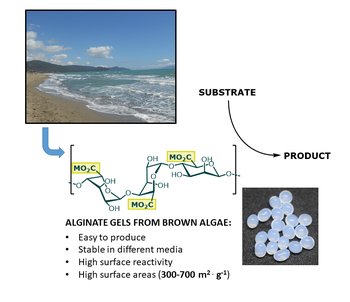
The replacement of traditional oil-based materials with renewable substrates, solvents and catalysts is essential for the development of sustainable synthetic methodologies. In this context, the exploitment of polysaccharides of marine origin, such as chitosan (deacetylated chitin) and alginates appears highly attractive as it does not compete with food production.
This project, carried out in collaboration with Dr. Nathalie Tanchoux (CNRS, Montpellier, France), unveils the utility of these renewable materials - more specifically alginates from brown algae - in enantioselective catalysis. It takes advantage of i) the high functional group density (>5 mmol carboxylic acid units per gram) of alginates, and of ii) their high propensity to form stable gels (hydro-, solvo-, aero-) characterised by attractive mechanical properties and high surface areas. Thus, alginates are used as gel supports for chiral organic catalysts and as chirality inducing elements, disclosing new opportunities in heterogeneous catalysis.